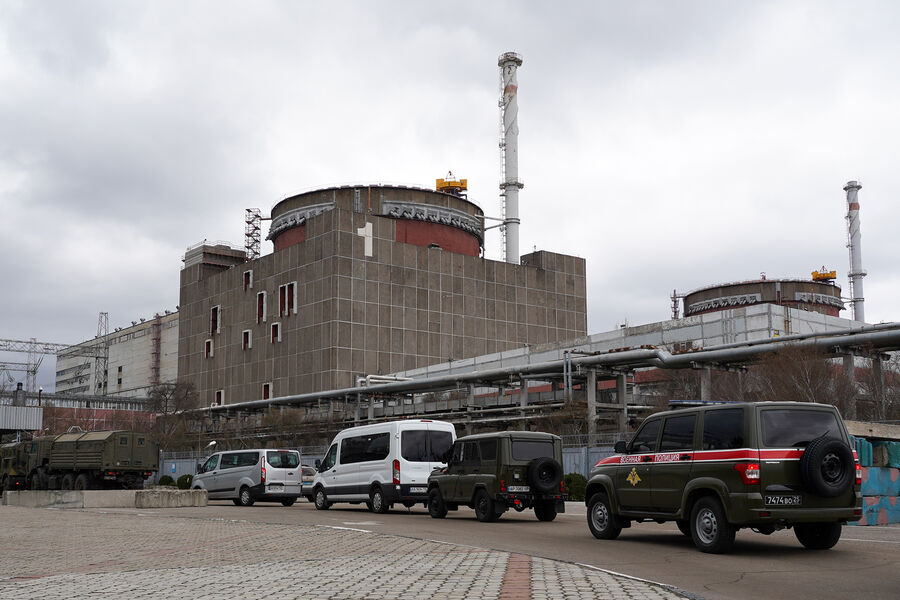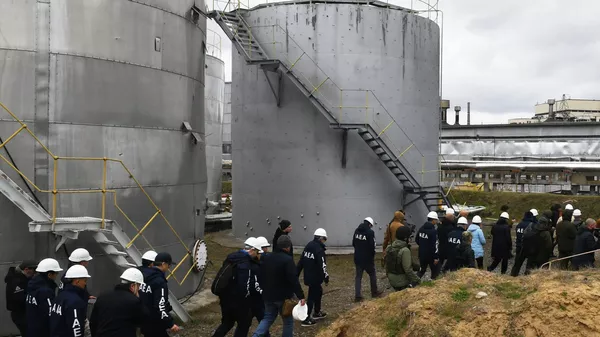 International Atomic Energy Agency (IAEA) Director General Grossi has visited the Zaporizhia NPP (ZNPP) at the head of a delegation of 11 people including three inspectors who arrived at the station to relieve the existing resident IAEA Support & Assistance Mission to Zaporizhia (ISAMZ) team at the plant. The delegation also included seven representatives of the UN Department of Safety & Security.
International Atomic Energy Agency (IAEA) Director General Grossi has visited the Zaporizhia NPP (ZNPP) at the head of a delegation of 11 people including three inspectors who arrived at the station to relieve the existing resident IAEA Support & Assistance Mission to Zaporizhia (ISAMZ) team at the plant. The delegation also included seven representatives of the UN Department of Safety & Security.
Since Russia took control of ZNPP in March 2022, the Russian national guard has been protecting the station and in October, Russian President Vladimir Putin signed a decree formally transferring ZNPP to Russian jurisdiction under nuclear utility Rosenergoatom (part of Rosatom). A Russian Federal State Unitary Enterprise. Zaporizhia NPP was established by Rosenergoatom to operate the plant.
However, Ukrainian nuclear utility Energoatom continues to claim ownership of the plant and the IAEA recognises this claim. ZNPP has been shelled regularly and has also been subjected to drone attacks, which Russia attributes to Ukrainian forces. Ukrainian troops have also on three occasions also tried to seize the plant using special forces. However, Ukraine accuses Russia of shelling the plant.
Together with Renat Karchaa, the advisor to Rosenergoatom’s Director General, the delegation made a tour of the plant site and inspected the facilities. This was Grossi's second visit to the NPP. During his first visit on 1st September 2022 he established ISAMZ system which has now seen seven rotations of staff. The previous rotation took place on 2 March after three failed attempts due to increased military activity. Karchaa told TASS that the three new experts, from Slovakia, France and Japan will stay at the NPP for about two months.
increased military activity. Karchaa told TASS that the three new experts, from Slovakia, France and Japan will stay at the NPP for about two months.
At a press conference after touring the NPP facilities, Grossi said the purpose of his visit was to assess the situation at the NPP since his previous visit in September. He noted that the situation had not improved. “It is obvious that military activity is increasing in the region, so every possible effort and precaution should be taken so that the plant can be protected,” he said. He explained that for his visit to take place there were very specific procedures that had to be followed. “These include consultation between the UN Department of Safety & Security and the armed forces of both countries [Russia & Ukraine],” he noted.
“Every precaution is taken, although we know that in time of war and active combat, unexpected situations may arise,” he said. He recalled the “difficult” circumstances of his first trip to the plant. On that occasion his delegation’s arrival from Ukrainian territory was delayed by military activity and also by an unsuccessful attempt by Ukrainian special forces to storm the NPP using boats. However, he said on the current trip “we did not have a problem”, adding that “God willing the return will be quiet.”
He continued: “I think it is no secret that there is a significant increase in the number of trips in the region and there is open talk about offensives and counter-offensives.”
Stressing that his focus was on nuclear safety and security, he said he had been “working with the leadership in Kyiv and in Moscow as well in order to establish measures aimed at protecting the plant” but that the concept was “evolving”. Initially, the different ideas and concepts under discussion had focused on “the possibility of establishing a well determined zone around the plant”. Now, however, “we are focusing more on protection… and the things that should be avoided in order to protect the plant” rather than “the territorial aspects, which pose certain problems”. He added; “It is a work in progress.”
Grossi said all the various ideas, statements and opinions on the subject prove one thing. “This is that it is very, very important we agree on the fundamental principal that a NPP should not be attacked under any circumstances and that it should not be used to attack others likewise.” He elaborated: “A NPP should never be a military target and there should never be heavy military weapons or equipment at a NPP.”
He concluded: I am trying to put on the table realistic, viable proposals that can be accepted by all. A nuclear accident with radiological consequences will spare no-one – not Russia, Ukraine or the rest of Europe.”
After leaving the NPP Grossi held another press conference in Dnipro in Ukraine, where he again noted the increase in military activity. He said on the way to the NPP “this was obvious in terms of the military presence, visible signs of damage and destruction”. At the plant itself he was “able to make an assessment of the attack and shelling that took place on 20 November, which was quite severe. “It was quite important to have a look at that. It affected two reactors, wittingly or unwittingly – the buildings of the reactors were hit. This is very serious.”
Grossi noted that he was “also able to look at and evaluate some of the measures that have been taken by the operators there, which is also very important.” This was probably a reference to the construction work which has been undertaken by Rosatom at the plant to provide better protection for the used fuel storage facility.
He said the visit was “very valuable to confirm my evaluation of the seriousness and… the gravity of the situation and the need for us to get results as soon as possible”. It was also “essential for me to make my own assessment of the gravity of the situation and some of the technical assumptions I have when I make my proposals.” He added: “It will be important in my conversations, consultations and negotiations because I have seen it with my own eyes.”
Grossi also commented on staffing at the NPP – which has been the subject of conflicting reports by the Russian operators and Ukraine’s nuclear utility Energoatom. “I am taking new information with me, which I will be evaluating,” he said. “I will be sharing my conclusions with the operators and also of course with Ukraine in order for the Agency to make the necessary recommendations.”
Commenting on the visit, Rosenergoatom’s Renat Karchaa said:
"The whole point of Grossi’s ‘concept' is that you can never shoot at a NPP, under any pretexts or under any circumstances…. Grossi meant by the concept the fundamental principle of nuclear safety " He further pointed out that the real change in the IAEA's vision of this issue is to abandon any idea of demilitarisation of the station. “Grossi and the IAEA finally realised that the story of demilitarisation is unrealisable, and they refused to discuss this topic further – it is closed, it is off the agenda," Karchaa said.
Grossi and Karchaa held a telephone conversation on Wednesday, in which they discussed the responsibility of the parties for the implementation of agreements, TASS reported. "Russia is ready to sign any agreements, but directly related to the safety of the plant, namely: the NPP cannot be fired at and it cannot be used to strike enemy positions. We did not allow ourselves to do this and will not allow it," Karchaa said, stressing that the station has never hosted offensive and heavy equipment.
Images courtesy of IAEA






